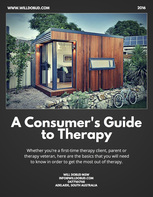Contact WillIf you would like help finding the perfect therapist for you or would like to book an initial consultation with me, you can contact me using the information below.
Phone: 0477161768 Email: [email protected] Online Appointment Scheduler |
A Consumer's Guide to TherapyThere is a bit of statistics here, I know sorry, but I hope that this brief “Guide for Consumers” will help you to locate helping professionals that will be of the upmost support for you and your family. I will also email the Full PDF to you directly when you submit your email below.
Why should I care about this as the Consumer? Remember the Seinfeld episode when Elaine is trying to get her medical chart from her doctor because the doctor had written negatively about her? As the consumer of therapeutic services you are not only the "patient" but an active participant: you and your therapist are equally important. By collecting feedback therapists help more people. Research has found that feedback-informed therapists more than doubles the effectiveness of therapy with evidence from thousands of cases! So why should you be left in the dark? Also, outcomes hold us therapists accountable! Is therapy effective? The effectiveness of therapy has been researched extensively for the last 50 years finding that the average person engaged with a therapist is better off than 80% who don’t. Scientifically speaking, seeing a therapist is an incredibly effective way to relieve psychological symptoms and distress no matter your age, sex, diagnosis, or culture. |
How long should I see a therapist?
More good news here: You should experience change early on in therapy! 30% of clients improve within two sessions, 65% within seven, and 75% by six months. Further, 85% of clients improve within one year. If you do not feel an early shift within your first three or four visits, it may be worth talking to your therapist.
Who is the most effective?
Of course, there are certain therapists who are more effective than others. How do you find them? A good question to ask a potential therapist is how effective they are at helping situations like yours. It may be a cause for concern if they do not have clear evidence for this. Research has found that therapists who routinely measure their effectiveness provide far better outcomes than those that do not.
What does “Routinely Measure Effectiveness” mean?
By using scientific measures, just like getting your blood pressure checked every time you visit the doctor, a therapist can ensure that things are moving in the right direction. This is done through feedback. More research shows that your feedback (you are the consumer after all) is incredibly helpful. You just need to find a therapist that will use it.
How do you gather feedback?
I use two scales, the Outcome Rating Scale and Session Rating Scale each taking less than a minute for clients to complete and for me to measure. Delivered at the start of each session, the Outcome Rating Scale measures how the client has progressed since the previous session. At the end, the Session Rating Scale allows for clients to provide feedback about the session. Therapists that listen to this feedback are able to tailor their services to improve outcomes and the therapeutic relationship.
When I see a young person or parent for a session their “voice and choice” is privileged in directing the course of therapy. You should feel that you are not only the recipient of therapy but also a participant letting the therapist know what is working and what isn’t.
For more information about this approach or my effectiveness, you can contact me at [email protected] or on 0477161768.
Will Dobud MSW
[email protected]
www.truenorthexpeditions.com.au
www.willdobud.com
More good news here: You should experience change early on in therapy! 30% of clients improve within two sessions, 65% within seven, and 75% by six months. Further, 85% of clients improve within one year. If you do not feel an early shift within your first three or four visits, it may be worth talking to your therapist.
Who is the most effective?
Of course, there are certain therapists who are more effective than others. How do you find them? A good question to ask a potential therapist is how effective they are at helping situations like yours. It may be a cause for concern if they do not have clear evidence for this. Research has found that therapists who routinely measure their effectiveness provide far better outcomes than those that do not.
What does “Routinely Measure Effectiveness” mean?
By using scientific measures, just like getting your blood pressure checked every time you visit the doctor, a therapist can ensure that things are moving in the right direction. This is done through feedback. More research shows that your feedback (you are the consumer after all) is incredibly helpful. You just need to find a therapist that will use it.
How do you gather feedback?
I use two scales, the Outcome Rating Scale and Session Rating Scale each taking less than a minute for clients to complete and for me to measure. Delivered at the start of each session, the Outcome Rating Scale measures how the client has progressed since the previous session. At the end, the Session Rating Scale allows for clients to provide feedback about the session. Therapists that listen to this feedback are able to tailor their services to improve outcomes and the therapeutic relationship.
When I see a young person or parent for a session their “voice and choice” is privileged in directing the course of therapy. You should feel that you are not only the recipient of therapy but also a participant letting the therapist know what is working and what isn’t.
For more information about this approach or my effectiveness, you can contact me at [email protected] or on 0477161768.
Will Dobud MSW
[email protected]
www.truenorthexpeditions.com.au
www.willdobud.com


